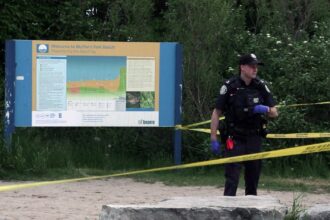In a devastating turn of events yesterday afternoon, a partial building collapse at a construction site in Montreal’s east end has left one worker dead and two others seriously injured, sending shockwaves through the city’s construction industry. The incident occurred around 2:30 p.m. at a commercial renovation project on Hochelaga Street, where workers were reportedly removing structural elements when a section of the second floor suddenly gave way.
“It was like a thunderclap followed by a cloud of dust,” recounted Marie Tremblay, who operates a café across the street from the site. “Within minutes, emergency vehicles were everywhere, and we could see first responders rushing in with equipment.”
According to preliminary investigations by the Commission des normes, de l’équité, de la santé et de la sécurité du travail (CNESST), Quebec’s workplace safety board, the collapse appears to have resulted from the removal of a load-bearing wall without proper temporary supports in place. The CNESST has sealed off the site and launched a comprehensive investigation, which could take several months to complete.
The deceased worker, a 42-year-old man whose identity has not been released pending notification of family members, was pronounced dead at the scene. The two injured workers, ages 36 and 51, were transported to Montreal General Hospital with what paramedics described as “serious but non-life-threatening injuries.”
This tragedy marks the fourth fatal construction accident in Montreal this year, raising alarming questions about workplace safety protocols. The construction company involved, Constructions Métropolitaines, has been operating in Quebec for over 15 years but has previously been cited for safety violations, according to CNESST records.
“The construction industry remains one of the most dangerous sectors for workers in Canada,” noted Dr. Emma Wilson, an occupational health expert at McGill University. “Despite robust regulations, we continue to see preventable accidents that suggest implementation and enforcement gaps.”
Montreal Mayor Valérie Plante expressed her condolences on social media, calling the incident “a terrible tragedy that should never have happened” and pledging the city’s support for improved safety measures. Meanwhile, the Quebec Construction Association has called an emergency meeting of its safety committee to discuss the incident and potential industry-wide responses.
Union representatives have pointed to ongoing pressures in the construction industry, where tight deadlines and labor shortages can sometimes lead to safety compromises. “We’ve been warning about these conditions for years,” said Jean-Philippe Caron, spokesperson for the Quebec Construction Workers Alliance. “How many more workers need to die before we see meaningful change?”
For the families affected by yesterday’s collapse, these systemic questions offer little comfort. As investigations continue and the community grapples with another workplace fatality, the incident serves as a stark reminder of the dangers faced daily by construction workers across the country.
As Montreal’s construction boom continues unabated, with cranes dotting the skyline and renovation projects transforming neighborhoods, we must ask ourselves: Are we willing to accept these human costs as an inevitable part of progress, or will this tragedy finally catalyze the cultural shift needed to prioritize worker safety above all else?

























